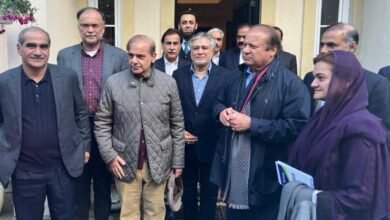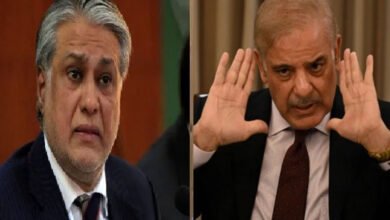Tax relief for smokers: Tobacco mafia floats on surface during PML-N govt
The tobacco mafia floated on the surface during the PML-N government as the industry was given a huge tax relief worth billions.

The tobacco mafia floated on the surface during the Pakistan Muslim League Nawaz (PML-N) government as the industry was given a huge tax relief worth billions.
A public limited tobacco manufacturing company, Philio Morris Pakistan Limited (PMPKL) has recently thanked the PML-N government and the Federal Board of Revenue (FBR) for the implementation of the Track and Trace System for the tobacco industry.
Pakistan’s chapter of the international tobacco manufacturing company expressed happiness through an ad in an English daily of Jang Media Group’s newspaper, The News, over a major tax relief as the government has reportedly ‘quietly given billions of rupees in tax relief by increasing the taxable price threshold for the expensive cigarette brands.’
The advertisement read, “We are confident that this initiative will go a long way toward curbing illicit trade in tobacco by combatting non-tax-paying tobacco manufacturers and traders who are selling cigarettes significantly below the minimum price mandated by law and are causing an estimated annual loss of PKR 80 billion to the national exchequer.”
“Pakistan is a resilient country, a land of opportunities, and PMPKL is committed to working towards its prosperity by supporting the government’s initiatives on curbing the issue of illicit trade,” stated the tobacco company in the advertisement.
After imposing hefty taxes that increased the financial burden on the nationals, the PML-N government has surprisingly benefitted the tobacco industry that will promote smoking instead of discouraging the hazardous trend.
Pakistan, heaven of tobacco industry
According to Express Tribune, contrary to Prime Minister Shehbaz Sharif’s instructions and the main coalition partner’s lobbying for increase in taxes on smoking, the government has quietly given billions of rupees in tax relief by increasing the taxable price threshold for the expensive cigarette brands.
The change was made on the eve of approval of the budget by the National Assembly, which also eroded the benefits that the government wanted to earn by slightly increasing the federal excise duty on cigarettes.
A government that could not stand before the International Monetary Fund (IMF) to protect the salaried class from the additional tax burden changed the taxable price slabs to keep smoking affordable. The change was not made on June 10 aimed at avoiding public debate on the issue.
The government has increased the threshold for higher duties on the expensive cigarette brands, according to the Finance Act 2022 that was enforced from July 1.
Before the budget, the government was charging excise duty of Rs5,200 per 1,000 cigarettes, if the printed retail price was over Rs5,960 per 1,000 sticks.
In the budget, the government increased the excise duty by Rs700 or 13.5% to Rs5,900 per 1,000 cigarettes for the expensive brands. The per cigarette additional tax impact is only 70 paisa.
However, in order to offset the impact and also bring a few expensive brands in the lower tax slab, the government also increased the taxable threshold for the upper brand cigarettes from the printed price of Rs5,960 per 1,000 sticks to Rs6,660 – a benefit of Rs700 on every 1,000 cigarettes.
Had the government not increased the upper brands’ taxable price limit, many brands that now fall in the low tax tier would have been shifted to the upper tier. This might have discouraged smoking in the country.
Before the budget, the FED on the locally produced cigarettes with a retail price of less than Rs5,960 per 1,000 cigarettes was Rs1,650 that in the budget was increased to Rs1,850.
This amounts to additional tax of a mere 20 paisa per cigarette. The threshold to determine the low tax rate was up to Rs5,960, which has also now gone up to Rs6,660.
After the change in the taxable price slab, a few brands that were earlier taxed at a reduced rate of Rs5,200 would now be charged a tax of Rs1,850 per 1,000 sticks.
“The government has tricked with the people who advocated increasing the tax burden to discourage smoking,” said Dr Ziauddin, Country Lead on Tobacco Control, Vital Strategies.
He argued that after the increase in the taxable slab limit, the smoking prevalence would increase, which would also significantly push up the cost of illness.
As many as 31 million adults (age 15 +) or about one-fifth of the total adults currently use tobacco, according to Social Policy and Development Centre (SPDC). It added tobacco use is the leading cause of death due to non- communicable diseases (NCDs), such as cancer, chronic respiratory diseases, and cardiovascular disease.
Due to unchanged and low tobacco taxes, Pakistan ranks among the worst-performing countries in the Tobacconomics Cigarette Tax Scorecard that evaluates the strength of tax systems, with an overall tax system score of less than one on a five-point scale.
According to SPDC estimates, more than 260,000 people will start smoking in Pakistan, if tobacco taxes are not raised in 2022-23, while around 150,000 die every year due to smoking related diseases. While chairing a cabinet meeting on new budget proposals on June 10th, Prime Minister Shehbaz Sharif had showed his dissatisfaction with the proposed increase in FED rates and sought that the taxation burden should be further increased by Rs25 billion in the new fiscal year.
However, the changes in the taxable price slabs would not help achieving this objective.
Marriyum Aurangzeb’s husband in tobacco industry
Pakistan Tehreek-e-Insaf (PTI) leader and Imran Khan’s Chief of Staff Dr Shahbaz Gill slammed the coalition government over the tax relief to the tobacco industry, saying that the relief was not given by Prime Minister Shehbaz Sharif but the Information Minister Marriryum Aurangzeb gave it ‘as a gift to her husband.” He alleged that Marriyum Aurangzeb has charged the fee for spreading lies day and night.
کیا مریم اورنگزیب نے ایک انگلی کے اشارے سے اربوں روپے کا فائدہ اٹھا لیا ؟ کیا جب کابینہ میں اس چیز پر فیصلہ ہو رہا تھا تو مریم اورنگزیب کابینہ میں موجود تھیں ؟ اگر موجود تھیں تو کیوں موجود تھیں ؟ کیا اس فیصلے سے ان کے شوہر کو فائدہ پہنچتا ہے ؟ pic.twitter.com/ZUP6neIo2l
— Dr. Shahbaz GiLL (@SHABAZGIL) July 6, 2022
He then raised questions before the federal government, “Hasn’t Marriyum Aurangzeb received benefits of billions? Was Marriyum Aurangzeb present in the cabinet meeting in which the decision was taken? If she was there, then what is the reason for her presence there? Hasn’t her husband received benefits from the decision?”
یہ شہباز شریف نے نہیں دیا۔ یہ مریم اورنگزیب نے اپنے شوہر محترم کو تحفہ دیا ہے۔ ایسے ہی تو باجی دن رات جھوٹ نہیں بولتی۔ قیمت تو وصول کرتی ہیں۔ https://t.co/z3GOboKlDv
— Dr. Shahbaz GiLL (@SHABAZGIL) July 6, 2022
Gill also shared the ET report on tax relief to the tobacco manufacturers in Pakistan.




